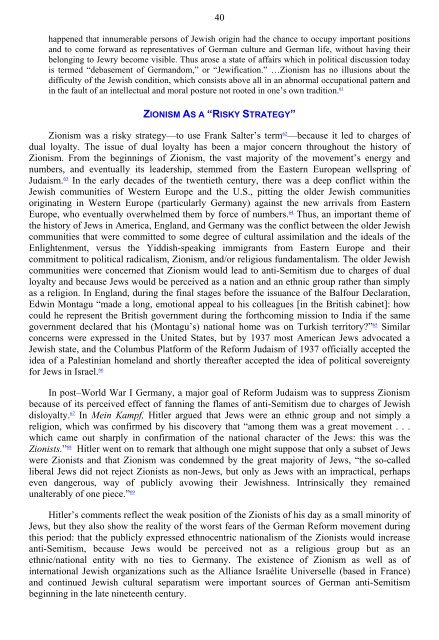Understanding Jewish Influence - Adolf Hitler and Third Reich Media
Understanding Jewish Influence - Adolf Hitler and Third Reich Media
Understanding Jewish Influence - Adolf Hitler and Third Reich Media
You also want an ePaper? Increase the reach of your titles
YUMPU automatically turns print PDFs into web optimized ePapers that Google loves.
40<br />
happened that innumerable persons of <strong>Jewish</strong> origin had the chance to occupy important positions<br />
<strong>and</strong> to come forward as representatives of German culture <strong>and</strong> German life, without having their<br />
belonging to Jewry become visible. Thus arose a state of affairs which in political discussion today<br />
is termed “debasement of Germ<strong>and</strong>om,” or “Jewification.” …Zionism has no illusions about the<br />
difficulty of the <strong>Jewish</strong> condition, which consists above all in an abnormal occupational pattern <strong>and</strong><br />
in the fault of an intellectual <strong>and</strong> moral posture not rooted in one’s own tradition. 61<br />
ZIONISM AS A “RISKY STRATEGY”<br />
Zionism was a risky strategy—to use Frank Salter’s term 62 —because it led to charges of<br />
dual loyalty. The issue of dual loyalty has been a major concern throughout the history of<br />
Zionism. From the beginnings of Zionism, the vast majority of the movement’s energy <strong>and</strong><br />
numbers, <strong>and</strong> eventually its leadership, stemmed from the Eastern European wellspring of<br />
Judaism. 63 In the early decades of the twentieth century, there was a deep conflict within the<br />
<strong>Jewish</strong> communities of Western Europe <strong>and</strong> the U.S., pitting the older <strong>Jewish</strong> communities<br />
originating in Western Europe (particularly Germany) against the new arrivals from Eastern<br />
Europe, who eventually overwhelmed them by force of numbers. 64 Thus, an important theme of<br />
the history of Jews in America, Engl<strong>and</strong>, <strong>and</strong> Germany was the conflict between the older <strong>Jewish</strong><br />
communities that were committed to some degree of cultural assimilation <strong>and</strong> the ideals of the<br />
Enlightenment, versus the Yiddish-speaking immigrants from Eastern Europe <strong>and</strong> their<br />
commitment to political radicalism, Zionism, <strong>and</strong>/or religious fundamentalism. The older <strong>Jewish</strong><br />
communities were concerned that Zionism would lead to anti-Semitism due to charges of dual<br />
loyalty <strong>and</strong> because Jews would be perceived as a nation <strong>and</strong> an ethnic group rather than simply<br />
as a religion. In Engl<strong>and</strong>, during the final stages before the issuance of the Balfour Declaration,<br />
Edwin Montagu “made a long, emotional appeal to his colleagues [in the British cabinet]: how<br />
could he represent the British government during the forthcoming mission to India if the same<br />
government declared that his (Montagu’s) national home was on Turkish territory” 65 Similar<br />
concerns were expressed in the United States, but by 1937 most American Jews advocated a<br />
<strong>Jewish</strong> state, <strong>and</strong> the Columbus Platform of the Reform Judaism of 1937 officially accepted the<br />
idea of a Palestinian homel<strong>and</strong> <strong>and</strong> shortly thereafter accepted the idea of political sovereignty<br />
for Jews in Israel. 66<br />
In post–World War I Germany, a major goal of Reform Judaism was to suppress Zionism<br />
because of its perceived effect of fanning the flames of anti-Semitism due to charges of <strong>Jewish</strong><br />
disloyalty. 67 In Mein Kampf, <strong>Hitler</strong> argued that Jews were an ethnic group <strong>and</strong> not simply a<br />
religion, which was confirmed by his discovery that “among them was a great movement . . .<br />
which came out sharply in confirmation of the national character of the Jews: this was the<br />
Zionists.” 68 <strong>Hitler</strong> went on to remark that although one might suppose that only a subset of Jews<br />
were Zionists <strong>and</strong> that Zionism was condemned by the great majority of Jews, “the so-called<br />
liberal Jews did not reject Zionists as non-Jews, but only as Jews with an impractical, perhaps<br />
even dangerous, way of publicly avowing their <strong>Jewish</strong>ness. Intrinsically they remained<br />
unalterably of one piece.” 69<br />
<strong>Hitler</strong>’s comments reflect the weak position of the Zionists of his day as a small minority of<br />
Jews, but they also show the reality of the worst fears of the German Reform movement during<br />
this period: that the publicly expressed ethnocentric nationalism of the Zionists would increase<br />
anti-Semitism, because Jews would be perceived not as a religious group but as an<br />
ethnic/national entity with no ties to Germany. The existence of Zionism as well as of<br />
international <strong>Jewish</strong> organizations such as the Alliance Israélite Universelle (based in France)<br />
<strong>and</strong> continued <strong>Jewish</strong> cultural separatism were important sources of German anti-Semitism<br />
beginning in the late nineteenth century.








![The Big Lie 9-11 and Government Complicity in Mass Murder [PDF]](https://img.yumpu.com/50957077/1/190x245/the-big-lie-9-11-and-government-complicity-in-mass-murder-pdf.jpg?quality=85)








